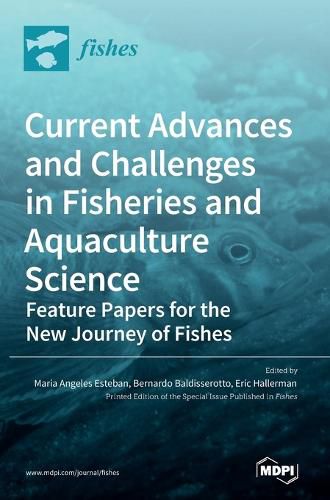Readings Newsletter
Become a Readings Member to make your shopping experience even easier.
Sign in or sign up for free!
You’re not far away from qualifying for FREE standard shipping within Australia
You’ve qualified for FREE standard shipping within Australia
The cart is loading…






This title is printed to order. This book may have been self-published. If so, we cannot guarantee the quality of the content. In the main most books will have gone through the editing process however some may not. We therefore suggest that you be aware of this before ordering this book. If in doubt check either the author or publisher’s details as we are unable to accept any returns unless they are faulty. Please contact us if you have any questions.
This addresses current advances and challenges in fisheries and aquaculture science. Exposure of larval fish to elevated temperatures during embryological development may induce craniofacial and morphological alterations, which are suggested possible impacts of global warming. Molecular markers shed new light on the ontogenetic migration of stream fishes. Fast growth rates, early age at maturity, moderate fecundity, and diverse diet explain the potential for introduced fishes to dominate fish communities in their native and introduced range. Taking videos of marine benthic habitats supports low-impact, real-time monitoring of species occurrence. Among heavily fished species, almost half had outdated demographic assessments that would benefit from the integration of data from fisheries sources and improved collaboration among fishery stakeholders and managers. The continued growth of aquaculture will depend upon developing feeds that improve the growth, oxidative status, and immune response of fed cultured organisms. New aquaculture feedstuffs might be derived from plants or microbes, and new additives would include ghrelins and dietary symbiotics. The effects of these constituents on survival, growth, gut histomorphology, immune response were assessed for cultured freshwater and marine species. The results provide suggestions for advances in aquafeeds for the species studied and for cultured fishes more generally. The scientific advances realized with the use of new tools provide the basis for addressing global challenges to fisheries, aquaculture and for ongoing scientific research.
$9.00 standard shipping within Australia
FREE standard shipping within Australia for orders over $100.00
Express & International shipping calculated at checkout
This title is printed to order. This book may have been self-published. If so, we cannot guarantee the quality of the content. In the main most books will have gone through the editing process however some may not. We therefore suggest that you be aware of this before ordering this book. If in doubt check either the author or publisher’s details as we are unable to accept any returns unless they are faulty. Please contact us if you have any questions.
This addresses current advances and challenges in fisheries and aquaculture science. Exposure of larval fish to elevated temperatures during embryological development may induce craniofacial and morphological alterations, which are suggested possible impacts of global warming. Molecular markers shed new light on the ontogenetic migration of stream fishes. Fast growth rates, early age at maturity, moderate fecundity, and diverse diet explain the potential for introduced fishes to dominate fish communities in their native and introduced range. Taking videos of marine benthic habitats supports low-impact, real-time monitoring of species occurrence. Among heavily fished species, almost half had outdated demographic assessments that would benefit from the integration of data from fisheries sources and improved collaboration among fishery stakeholders and managers. The continued growth of aquaculture will depend upon developing feeds that improve the growth, oxidative status, and immune response of fed cultured organisms. New aquaculture feedstuffs might be derived from plants or microbes, and new additives would include ghrelins and dietary symbiotics. The effects of these constituents on survival, growth, gut histomorphology, immune response were assessed for cultured freshwater and marine species. The results provide suggestions for advances in aquafeeds for the species studied and for cultured fishes more generally. The scientific advances realized with the use of new tools provide the basis for addressing global challenges to fisheries, aquaculture and for ongoing scientific research.